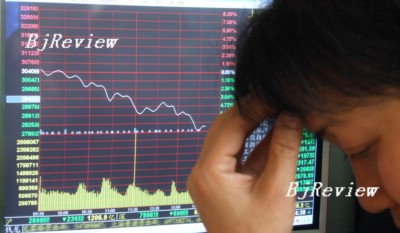
On a typical office afternoon, Zhang Hui opened the Shanghai Stock Exchange website as usual to check if her equity funds had brought in more money like before. Instead, she was surprised to find that the website was all green. Completely different from foreign counterparts, China uses green to indicate a declining market and red to show a rising one. On that day, February 27, the nation's benchmark Shanghai Composite Index dramatically nose-dived nearly 9 percent and closed at 2771.79 from the record-high opening that day of 3048.83. Zhang calculated later on that she lost half of the profit--about 900 yuan--she had made from buying the funds, the principal of which was worth 20,000 yuan.
On the same day, February 27, major stock markets underwent the same scenario with Dow Jones Industrial Average dropping 3.3 percent. In Europe, the FTSE 100 index lost 2.3 percent, the German DAX 30 index fell 2.3 percent and the French CAC-40 index declined 2.6 percent. The Hong Kong Heng Seng Index lost 1.8 percent. Japan's Nikkei 225 stock index closed down 2.85 percent the next morning. The markets fell like dominos and caused a worldwide wane in stock market value.
Black Tuesday, the name given to this massive market decline, was devastating, but some of those affected didn't understand its full implications right away.
As a stock market freshman, Zhang wasn't sure what that 9 percent decline meant.
"I knew I had lost some profit, but didn't realize I had gone through the worst ever stock market decline in a decade," said Zhang. "Although the newspapers and TV were making a fuss about it, I saw the stock market rebounded immediately the next day."
As a well-educated office lady, Zhang has been fully aware of the risks in the stock market ever since she first bought her equity funds last December. For her, the market sell-off was just like spring weather in Nanjing City where she lives. You never know when it will rain or shine.
But for stock market professionals, the 9 percent drop was shocking enough to trigger worldwide discussions on the "five Ws" cliché: who, what, where, when and why.
The Shanghai Composite Index soared over 130 percent last year. But since the Chinese stock market fell about 70 percent in bearish years from 2001 to 2005, the 130 percent growth is not shockingly high at all. Still, the market was due for a correction, and it did so abruptly as many experts suggested it would.
Black Tuesday's influence on China
This Black Tuesday could still prove to be forgettable. No sooner had Zhang Hui realized the significance of the plunge than the stock market resumed robust growth momentum.
| 